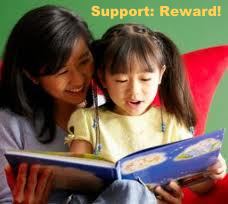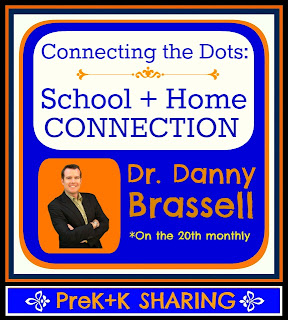Hello from the International Reading
Association’s annual conference in San Antonio, Texas. As luck would have it, I
am presenting a seminar entitled “The Power of Parents: Building School and
Home Connections,” based on a series of kits I have developed. The kits train
parents, teachers and administrators how to work together to best meet the
needs of each particular child.
As a parent you need to know that
your child is important to her teacher. Your child is vital to the success of
her teacher’s classroom and the school. Good teachers and administrators
recognize how important you are to the development of your child, and they are
excited to work with you to help your child. Contrary to what a lot of
policymakers and folks in the media will try to have you believe, most public
schools are doing a good job. As a matter of fact, their success is severely
understated and under-reported, while the extraordinary successes of a few
well-funded private and charter schools is heralded (there is plenty of data to
show that a public school receiving the same funding as these success stories
would achieve the same, or better, results). We can talk about that in a future
column.
Let’s talk about you. You are your
child’s single greatest teacher, and we educators need you to work with us.
Together, we can move mountains.
I understand what you are going
through, as I am a proud (and sometimes frustrated) parent of three. I know a
lot about education, and even I can find the school system overwhelming. So
what can we do together to do what is in the best interest of your child?
We simply need to connect the
“DOTS.”
Do
Play. The “D” in “DOTS” stands for “Do,” as in “Do Play.” It sounds like
common sense, but – as my friend Davy Tyburski likes to say, “common sense is
not common practice” nowadays. The role of play is critical in your child’s
development. It sounds so easy, and that is why many folks scoff at its
importance. Well, standing, walking, talking and eating are all fairly “easy,”
yet critical, processes. The benefits of playing with your child are as
widespread as a healthy diet, so make sure to “feed” your child’s emotional and
psychological development by playing board games, going on outings and spending
plenty of silly moments together.
Observe
and Model. The “O” in “DOTS” stands for “Observe,” as in “Observe and
Model.” Being the father of three children who have all grown up under the same
roof, I am constantly amazed by how different my son and two daughters are from
one another. All are gifts from God who have their own distinct gifts, and my
job – as their father – is to determine their strengths and weaknesses and
accommodate them. While my oldest daughter is naturally very motivated, my son
can take some prying to do certain things. Meanwhile, my son is one of the
kindest souls I have ever seen, while my daughters often fail to empathize with
those around them. As parents, we need to observe our children and model for
them expected behaviors. As an educator I can confess that before I meet most
students’ parents on “Back-to-School” night, I can easily match them with their
children, as they behave similarly. Kids who are late to school usually have
tardy parents, quiet children often have quiet parents, etc.
Talk
About Books. The “T” in “DOTS” stands for “Talk,” as in “Talk About Books”
with your child. What can I say? Reading is my passion, and I have gratefully
passed along that passion to my children (despite school’s attempts to take it
away by requiring meaningless exercises, like book reports). If you want your
child to succeed in school and in life, your child needs to be a passionate,
efficient reader. Make life easier on your child by giving her the joy of
reading. I can guarantee that children who like to read usually turn out to be
better readers than their peers who detest it. Why? They choose to do it on
their own outside of school, and every extra minute your child spends reading
enhances her “reading muscles” the way exercise helps your overall physical
fitness.
Support/Reward.
The “S” in “DOTS” stands for “Support,” as in “Support/Reward” your child’s
reading. By support I mean that you need to follow the interests of your child:
if she wants to read nothing but fashion magazines, let her read fashion
magazines. If she is fascinated with lemurs, help her get her hands on as many
texts about lemurs as you can find (I speak from experience on this one). And
when I suggest you should reward your child for reading, I do not mean you
should give her pizza and candy for getting through Little House on the Prairie. That just creates a new generation of
obese children who think of reading as a chore. Rather, reward your child with
frequent trips to libraries and bookstores. Heck, discount stores like Dollar
Tree and 99 Cent Store have all kinds of inexpensive books, writing supplies
and other items that send the message to your child that reading is a reward in
and of itself.
Parenting is not easy. Nobody hands
you a manual at the hospital.
You need to understand, though, that
you are doing a good job. If you read this column, I know you are a good parent
because you are a concerned parent (my theory states that concerned parents =
good parents). You want what is best for your child, and by working with your
child’s teacher and your school’s administrators, I am confident that together
we can move mountains with your child. More importantly, we will make learning
fun and meaningful for your child so that she becomes a lifelong learner.
Danny Brassell, Ph.D., is “America’s Leading Reading Ambassador,”
helping parents and educators inspire kids to love reading and achieve more. He
is the author of 14 books, and he acted as the lead consultant for the Building
School-Home Relationships kits (Shell,
2012) that have been enthusiastically
adapted in school districts across the country. A father of three and professor in the Teacher Education Department at California
State University-Dominguez Hills, he is the founder of The Lazy Readers’ Book
Club, www.lazyreaders.com, Google’s #1-ranked site for cool, “short book
recommendations” for all ages. Watch video tips and learn more from
Danny at www.dannybrassell.com,
where you can check out his TEDx-Village Gate talk The Reading Makeover and download other free resources.








Pinned! This is excellent information. Parents know how important their part is in a child's education, but may not know exactly what to do. Thanks for such helpful information.
ReplyDelete